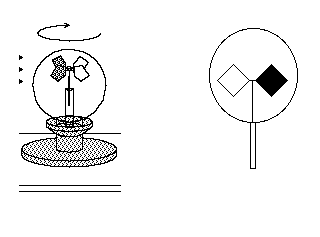Difference between revisions of "Crook's Radiometer"
From UO Physics Demonstration Catalog
(Created page with "{{NewDemo|subject=Thermodynamics|topic=Kinetic Theory|file1=Crooks_Radiometer.gif}} A sealed ball has vanes on which one side is black and the other white. When the sun or another source of bright light is directed onto the vane, it begins to rotate. '''Location: ''' * Shelf E-4") |
|||
| Line 1: | Line 1: | ||
{{NewDemo|subject=Thermodynamics|topic=Kinetic Theory|file1=Crooks_Radiometer.gif}} | {{NewDemo|subject=Thermodynamics|topic=Kinetic Theory|file1=Crooks_Radiometer.gif}} | ||
A sealed ball has vanes on which one side is black and the other white. When the sun or another source of bright light is directed onto the vane, it begins to rotate. | A sealed ball has vanes on which one side is black and the other white. When the sun or another source of bright light is directed onto the vane, it begins to rotate. Which direction should it turn? Re-emitted photons says the opposite direction. An explanation is the black surface is warmer than the white. There is a low pressure gas inside, so a gas molecule hits the black surface and picks up speed and is reflected with a higher speed, therefore, the impulse determines the direction of rotation. | ||
'''Location: | '''Location: | ||
''' | ''' | ||
* Shelf E-4 | * Shelf E-4 | ||
Latest revision as of 07:43, 10 January 2023
Return to Kinetic Theory
Description:
A sealed ball has vanes on which one side is black and the other white. When the sun or another source of bright light is directed onto the vane, it begins to rotate. Which direction should it turn? Re-emitted photons says the opposite direction. An explanation is the black surface is warmer than the white. There is a low pressure gas inside, so a gas molecule hits the black surface and picks up speed and is reflected with a higher speed, therefore, the impulse determines the direction of rotation.
Location:
- Shelf E-4
